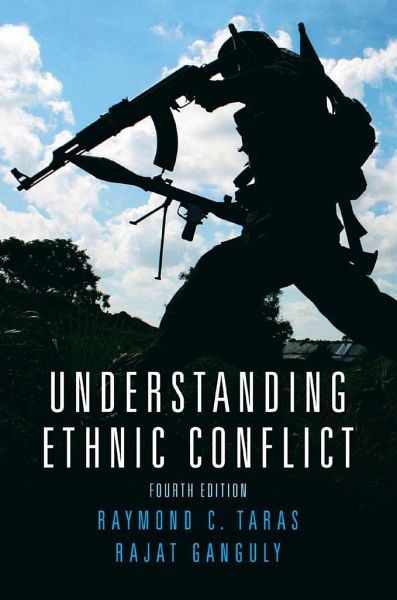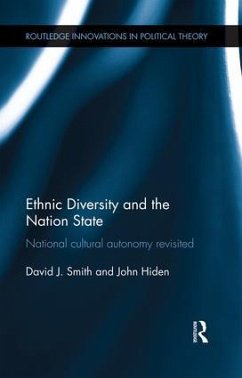
Understanding Ethnic Conflict
Versandkostenfrei!
Versandfertig in 1-2 Wochen
127,99 €
inkl. MwSt.

PAYBACK Punkte
64 °P sammeln!
Understanding Ethnic Conflict provides all the key concepts needed to understand conflict among ethnic groups.
Including approaches from both comparative politics and international relations, this text offers a model of ethnic conflict's internationalization by showing how domestic and international actors influence a country's ethnic and sectarian divisions. Illustrating this model in five original case studies, the unique combination of theory and application in Understanding Ethnic Conflict facilitates more critical analysis of contemporary ethnic conflicts and the world's response to them.
"Taras and Ganguly provide sophisticated but accessible coverage of political and violent conflict among ethnic groups in contemporary states. It is the most flexible text I have found since it covers approaches from both international relations and comparative politics and applies them to cases from advanced industrialized democracies, post-communist societies, and the developing world."-Donna Lee Van Cott, University of Connecticut
Product Description
Understanding Ethnic Conflict provides all the key concepts needed to understand conflict among ethnic groups. Including approaches from both comparative politics and international relations, this text offers a model of ethnic conflict's internationalization by showing how domestic and international actors influence a country's ethnic and sectarian divisions. Illustrating this model in five original case studies, the unique combination of theory and application in Understanding Ethnic Conflict facilitates more critical analysis of contemporary ethnic conflicts and the world's response to them.
Features + Benefits
Part I sets out theories of nationalism, ethnic conflict, and international relations.
Part II presents case studies applying the "internationalization-of-ethnic-conflict" model to ethnic conflict in Africa, Asia, Eurasia, North America, Europe, and the Middle East.
Figures and maps clarify complex data and events.
Discussion questions and key terms in each chapter promote critical thinking and reinforcement of essential concepts.
An extensive bibliography provides students with a list of sources for further reading and research.
I. ETHNIC CONFLICT AND INTERNATIONAL POLITICS: A CONCEPTUAL FRAMEWORK
Chapter 1. Ethnic Conflict on the World Stage
Chapter 2. Ethnic Conflict and International Norms
Chapter 3. Ethnic Conflict and International Security
Chapter 4. Resolving Ethnic Conflicts Through International Intervention
PART II. CASE STUDIES
Chapter 5. Nationalism and the Collapse of Empire: The Russian-Chechen Conflict
Chapter 6. Separatist Movements in Constitutional Democracies: Canada and Quebec Nationalism
Chapter 7. Protracted Ethnic Wars: The Tamil-Sinhalese Conflict in Sri Lanka
Chapter 8. Weak States and Ethnic Conflict: Secessionism and State Collapse in Africa
Chapter 9. Western Military Intervention and Ethnoreligious Conflicts: Iraq, Afghanistan, and Former Yugoslavia
Chapter 10. To Intervene or Not to Intervene?
Including approaches from both comparative politics and international relations, this text offers a model of ethnic conflict's internationalization by showing how domestic and international actors influence a country's ethnic and sectarian divisions. Illustrating this model in five original case studies, the unique combination of theory and application in Understanding Ethnic Conflict facilitates more critical analysis of contemporary ethnic conflicts and the world's response to them.
"Taras and Ganguly provide sophisticated but accessible coverage of political and violent conflict among ethnic groups in contemporary states. It is the most flexible text I have found since it covers approaches from both international relations and comparative politics and applies them to cases from advanced industrialized democracies, post-communist societies, and the developing world."-Donna Lee Van Cott, University of Connecticut
Product Description
Understanding Ethnic Conflict provides all the key concepts needed to understand conflict among ethnic groups. Including approaches from both comparative politics and international relations, this text offers a model of ethnic conflict's internationalization by showing how domestic and international actors influence a country's ethnic and sectarian divisions. Illustrating this model in five original case studies, the unique combination of theory and application in Understanding Ethnic Conflict facilitates more critical analysis of contemporary ethnic conflicts and the world's response to them.
Features + Benefits
Part I sets out theories of nationalism, ethnic conflict, and international relations.
Part II presents case studies applying the "internationalization-of-ethnic-conflict" model to ethnic conflict in Africa, Asia, Eurasia, North America, Europe, and the Middle East.
Figures and maps clarify complex data and events.
Discussion questions and key terms in each chapter promote critical thinking and reinforcement of essential concepts.
An extensive bibliography provides students with a list of sources for further reading and research.
I. ETHNIC CONFLICT AND INTERNATIONAL POLITICS: A CONCEPTUAL FRAMEWORK
Chapter 1. Ethnic Conflict on the World Stage
Chapter 2. Ethnic Conflict and International Norms
Chapter 3. Ethnic Conflict and International Security
Chapter 4. Resolving Ethnic Conflicts Through International Intervention
PART II. CASE STUDIES
Chapter 5. Nationalism and the Collapse of Empire: The Russian-Chechen Conflict
Chapter 6. Separatist Movements in Constitutional Democracies: Canada and Quebec Nationalism
Chapter 7. Protracted Ethnic Wars: The Tamil-Sinhalese Conflict in Sri Lanka
Chapter 8. Weak States and Ethnic Conflict: Secessionism and State Collapse in Africa
Chapter 9. Western Military Intervention and Ethnoreligious Conflicts: Iraq, Afghanistan, and Former Yugoslavia
Chapter 10. To Intervene or Not to Intervene?














